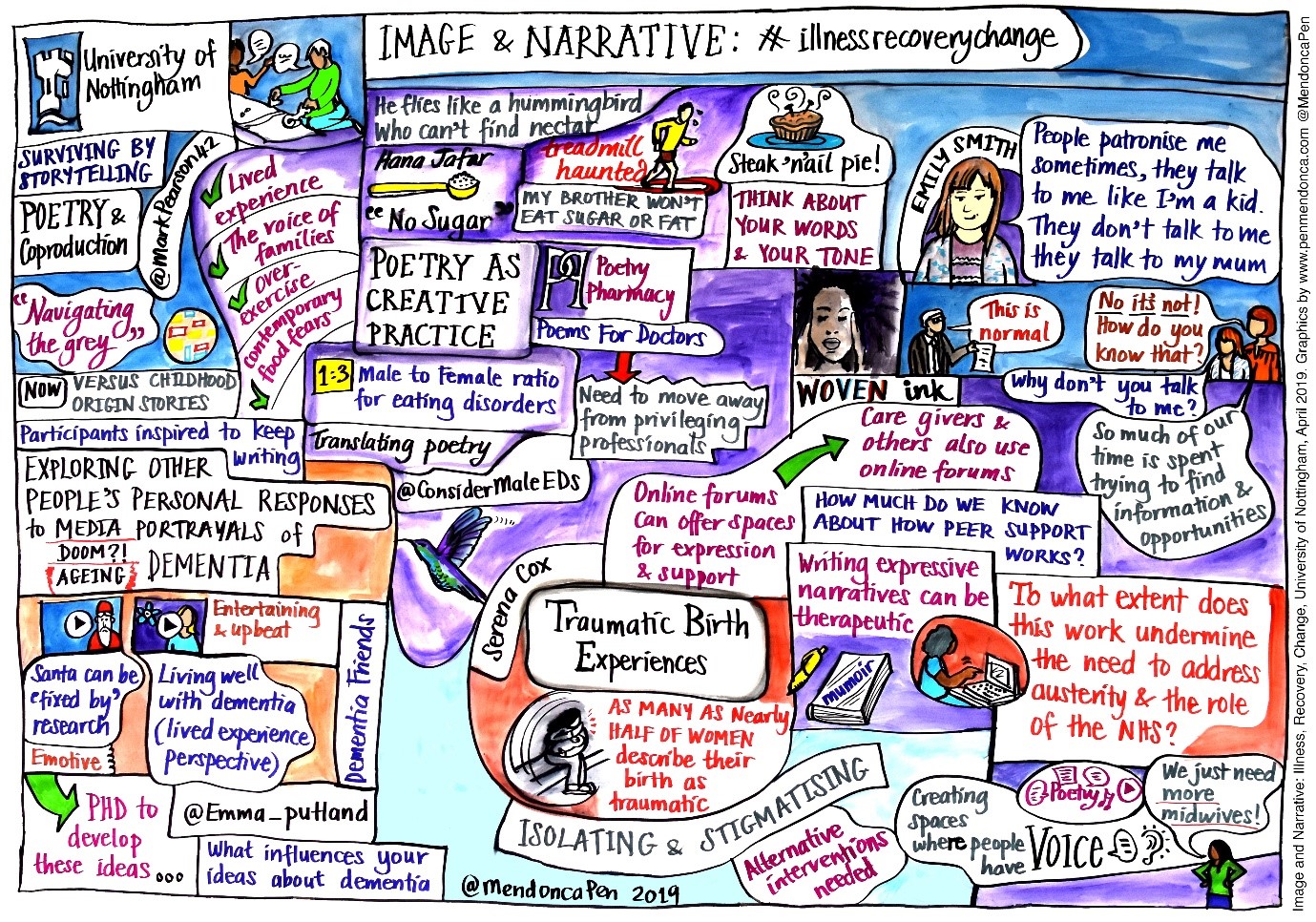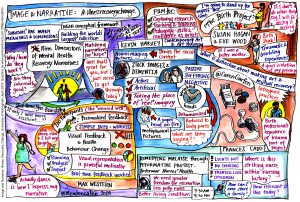
June 14, 2019, by Emma Putland
‘Image and Narrative: Illness, Recovery, Change’: Event report
Gabriele Neher reports on the Image and Narrative: Illness, Recovery, Change (#illnessrecoverychange) workshop that was run by the Health Humanities at the University of Nottingham, on Monday 29 April 2019.
Graphics by www.penmendonca.com @MendoncaPen.
The best way to talk about Image and Narrative is to let an image do the talking: this report includes artwork created by Penelope (Pen) Mendonca (Central St. Martins), artist, graphic facilitator and researcher. Pen was one of the participants who contributed to the Image and Narrative: Illness, Recovery, Change (#illnessrecoverychange) one-day workshop at the University of Nottingham in April. Pen observed the day and created the two artworks/ records that illustrate this report on a complex, rich and lovely day of storytelling and exploring. Contributions ranged from ‘standard’ conference papers (you know, the ones with power points and scripted notes) to the recounting of lived experiences of illness, to Caren Garfen showcasing some of her exquisitely rendered work, particularly from her Room for Improvement project. Caren’s work requires minute and close attention and is best viewed in conversation – essentially the entire day focussed on the important role played by narrative and stories, both as narrator shaping the stories but also as the listener/viewer experiencing the stories. Stories make sense of experiences – so understanding how illness impacts on the art of telling stories, how stories about illness are shaped by words and images, and exploring the dangers associated with creating dominant stories and sharing experiences, was what brought all the various strands of the debate together. Several of the contributors also explored questions around the dangers of storytelling and the creating of ‘false’ narratives. It should be remembered that this workshop followed on a previous workshop in January 2019 with a particular focus on creativity.
The day opened with a keynote paper, by Susan Hogan, Cultural Studies and Art Therapy, University of Derby) and Eve Wood (videographer) (https://blog.derby.ac.uk/2017/03/seven-reasons-women-take-art-giving-birth/), who introduced The Birth Project as an example of the AHRC-funded investigation, Creative Practice as Mutual Recovery. The Birth Project underlined the significance of creative practice and storytelling with regards to recovery from traumatic birth experiences and as a way of providing the women affected with a means to enhance their mental health and wellbeing. Throughout, it interrogated embedded assumptions about the experience of birth and expectations surrounding it. The project set out to answer such questions as: do healthcare institutions create unintentional illnesses by their medical practices? It tested assumptions and explored subjective experiences of birth and transition to motherhood, and thereby paved the way to a panel dedicated to the exploration of personal experiences of illness beyond birth.
The debate focussed on online peer support, explored aspects of dementia and interrogated the lived experiences of a young woman with Downs Syndrome and her mother. Have a look at how Pen Mendonca captured the frustrations of being denied a voice and being pigeonholed! It explored experiences, focused on words and reminded us of the importance of clear and inclusive words and images.
The day did much to bring different types of narratives together. In the morning panel, which focused on ‘personal expressions’, Serena Cox (Health Sciences) gave insight into ‘Traumatic Birth Experiences and Online Peer Support’; Emma Putland (English) explored ‘Other People’s Personal Responses to Media Portrayals of Dementia’; Emily and Sarah Smith celebrated ‘World Down Syndrome Day’ with an exploration of ‘Upside-down Language’; Hana Jafar (English, University of Manchester) gave insights into the use of poetry to ‘Articulate, Communicate and Understand Disordered Eating in Men’; and Mark Pearson (Health Sciences) discussed ‘Surviving my Storytelling’. In the afternoon panel, which was concerned with ‘collective representations’, Joy Llewellyn-Beardsley (Health Sciences) outlined ‘The Nine Dimensions of Mental Health Recovery Narratives’; Max Western (Behavioural Science, University of Bath) introduced ‘Visual Feedback and Health Behaviour Change’; Kevin Harvey (English) explored ‘Stock Images of Dementia’; and Frances Cadd (History) presented ‘Remedying Malaise through Performative Protest: A Case Study of Interwar Nurses’ Health’. Delegates could also choose one of two very different forms of ‘application’: Sue Hopcroft (Centre for Advanced Studies) gave advice regarding ‘Funding and Support’ whilst Elvira Perez Vallejos (Digital Technology and Mental Health) encouraged participation in her ‘Flamenco-Yoga’ workshop.
In parallel to the stimulating programme of talks and discussions a separate session was run as part of Heike Bartel’s ‘Hungry for Words’ project. Together with the animation team Woven Ink, the hands-on workshop gathered stories of male eating disorders from six men with lived experience and started to turn their experiences into an animated training video aimed at GPs, @ConsiderMaleEDs. Isolde Godfrey and Jess Harvey from Woven Ink also gave insight into their work and the role of animation to tell stories of trauma, illness, survivorship and health in the final plenary session for all participants.
What came through loud and clear throughout this successful and stimulating day was the importance of making every story matter.
It is good to talk. It is also good to listen.

Graphics by www.penmendonca.com @MendoncaPen.
Event coordinators: Mark Pearson, Emma Putland, Jonathan Memel, Heike Bartel
With special thanks to the Health Humanities Research Priority Area (RPA) for funding this project, and to all of the administrative staff for their valuable help and time, especially Michael Timmins (Web and Digital Officer, Faculty of Arts), and Claire Moody (Senior Administrator for Operations and Finance).
This discussion of how digital, visual and textual representation can support health is ongoing. If you are interested in or have been affected by this topic and would like to be involved, please contact a member of the organizing team (listed above) at their Nottingham email address.
No comments yet, fill out a comment to be the first

Leave a Reply